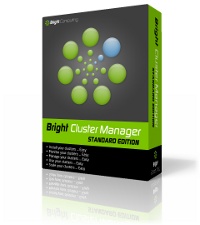 Today Bright Computing released Version 7.3 of Bright Cluster Manager and Bright OpenStack. With enhanced support for containers, the new release has enhanced integration with Amazon Web Services (AWS), improvements to the interface with the Ceph distributed object store and file system, and a variety of other updates that make deployment and configuration easier and more intuitive.
Today Bright Computing released Version 7.3 of Bright Cluster Manager and Bright OpenStack. With enhanced support for containers, the new release has enhanced integration with Amazon Web Services (AWS), improvements to the interface with the Ceph distributed object store and file system, and a variety of other updates that make deployment and configuration easier and more intuitive.
The demand for containers and integration with cloud services is increasing fast, and Version 7.3 adds many new features that improve ease of configuration and enhance user experience,” said Martijn de Vries, Chief Technology Officer of Bright Computing.
Bright Cluster Manager Version 7.3 extends Amazon Web Services (AWS) integration, so it now supports EC2-VPC for both Cluster-on-Demand and Cluster-Extension. Container upgrades include the ability to set up a Docker deployment from Bright’s Kubernetes Wizard or from command line interface, Flannel Networking integration for Kubernetes Pods, as well as integration to the Docker Registry, and support for Docker 1.11.
Bright Cluster Manager includes faster and more reliable deployment of big data tools. Support has been added for recent upgrades of selected Hadoop/Spark tools, wire-encryption, and security features on Kerberos. Bright Cluster Manager for Big Data also now supports Apache Cassandra and Alluxio, as well as new roles for Apache Zeppelin and Apache Ignite. Automated upgrades have been included for selected components, including HDFS and YARN.
Bright OpenStack Version 7.3 is based on the OpenStack Mitaka release and makes spinning up clusters for HPC and other uses inside an OpenStack private cloud quicker and easier than ever.
The new version also supports the latest two versions of Ceph (Infernalis and Jewel). It provides better feedback to users during setup, and generates more notification events for better monitoring. It also includes support for Fernet, a secure messaging format explicitly designed for use in API tokens by Heroku.



